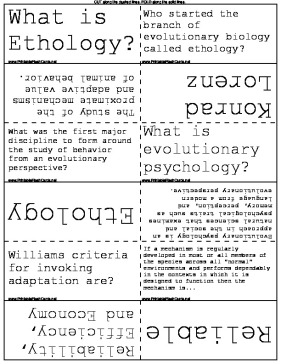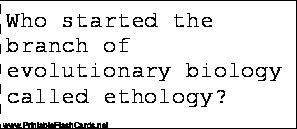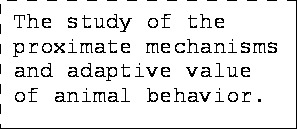

Anthropologists and biologists studying the subset of evolution called ethology can use these scientific flash cards.
There are 24 flash cards in this set (4 pages to print.)
To use:
1. Print out the cards.
2. Cut along the dashed lines.
3. Fold along the solid lines.
Sample flash cards in this set:




| Questions | Answers |
|---|---|
| What is Ethology? | The study of the proximate mechanisms and adaptive value of animal behavior. |
| Who started the branch of evolutionary biology called ethology? | Konrad Lorenz |
| What was the first major discipline to form around the study of behavior from an evolutionary perspective? | Ethology |
| What is evolutionary psychology? | Evolutionary psychology is an approach in the social and natural sciences that examines psychological traits such as memory, perception, and language from a modern evolutionary perspective. |
| Williams criteria for invoking adaptation are? | Reliability, Efficiency, and Economy |
| If a mechanism is regularly developed in most or all members of the species across all "normal" environments and performs dependably in the contexts in which it is designed to function then the mechanism is... | Reliable |
| If a mechanism solves a particular adaptive problem well then the mechanism is... | Efficient |
| If the mechanism solves the adaptive problem without extorting huge costs from the organism, then the mechanism is... | Economical |
| Inclusive Fitness says | Natural selection favors characteristics that cause an organism's genes to be passed on, regardless of whether the organism produces offspring directly. This means that genes can also be propagated through kin. |
| What are the three essential ingredients of natural selection? | Variation, Inheritance, and Selection |
| Organisms vary in all sorts of ways, why is variation essential for the process of evolution to operate? | Because variation provides the "raw materials" for evolution. |
| Considering variation, explain the role of inheritance in natural selection | Only the variations that are inherited play a role in the evolutionary process. Inherited variations are passed down through the generations, whereas deformities caused by environmental accidents are not. |
| Why is selection essential to the process of evolution? | Because those who have heritable variations that help with the tasks of survival or reproduction are able to leave more offspring. |
| What are the two primary ways that sexual selection operates? | Intrasexual Competition and Intersexual Selection |
| What is intrasexual competition? | Intrasexual Competition is the competition between members of one sex, the outcomes of which contribute to mating access to the other sex. (Two Stags locking horns is an example of intrasexual competition.) |
| What is intersexual selection? | Preferential mate choice. If members of one sex have some consensus about the qualities that are desired in members of the opposite sex, then individuals of the opposite sex who possess those qualities will be preferentially chosen as mates. |
| Comparative Psychology is the | Branch of psychology concerned with the behavior of animals. |
| What is cognitive psychology? | An approach to psychology that emphasizes internal mental processes |
| What is Sociobiology? | The scientific study of the biological (esp. ecological and evolutionary) aspects of social behavior in animals and humans. |
| What is the Standard Social Science Model (SSSM)? | A paradigm that views the mind as a general-purpose cognitive device shaped almost entirely by culture. |
| What does the Standard Social Science Model say? | Humans are born a blank slate, our brain is a "general-purpose" computer, culture/socialization programs behavior, cultures free to vary any direction on any trait, and biology is relatively unimportant to understand behavior. |
| The Standard Social Science Model says our cognitive mechanisms are domain-general meaning? | Our cognitive mechanisms are not specific (i.e., they apply to a wide variety of areas or contexts.) |
| What is Phenotype? | A phenotype is the composite of an organism's observable characteristics or traits, such as its morphology, development, biochemical or physiological properties, phenology, behavior, and products of behavior (such as a bird's nest). |
| What is Epigenetics? | Epigenetics is the study of heritable changes in gene activity that are not caused by changes in the DNA sequence. |